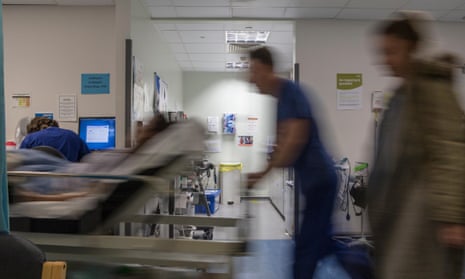The proportion of NHS staff in England who reported feeling unwell as a result of work-related stress increased by nearly 10% last year as the Covid pandemic took its toll, according to the health service’s 2020 survey.
The survey found that 44% reported feeling unwell as a result of work-related stress in the previous 12 months, compared with 40.3% in 2019. The proportion has steadily increased since 2016 (36.8%).
In a year like no other for the health service, the 2020 survey also found a slight reduction in respondents who said they often or always looked forward to going to work, and a bigger fall in those who said they were often or always enthusiastic about their job.
Nevertheless, the survey – which was carried out before Boris Johnson announced plans to give NHS England healthcare workers a 1% pay rise next year, prompting widespread fury – found that the proportion of staff who were thinking of leaving the NHS fell from 19.6% to 18.2%.
In a year in which ethnic minorities were heavily represented in the death toll of healthcare workers, and concerns were raised about being more likely to be pushed into frontline roles and about access to personal protective equipment, the responses relating to equality, diversity and inclusion were not so positive.
The proportion of staff who said their employer provided equal opportunities fell compared with 2019, with a decrease among black and minority ethnic staff from 71.2% to 69.2%.
While the proportion of staff who said they had personally experienced discrimination from patients was unchanged from the previous year at 7.2%, the proportion who said they had experienced it from managers or colleagues rose from 7.7% to 8.4% – the highest level for five years.
Danny Mortimer, the chief executive of the NHS Confederation, said the overall picture was encouraging in the circumstances, adding: “There are, though, significant areas of concern, and the recent data on the continued poorer experience of ethnic minority staff starkly reminds NHS leaders that staff experience varies unacceptably in their organisations.
“With the government once again reiterating its intention to offer only a 1% pay rise, there can be no room for complacency when the results also show that around a third of staff are considering leaving their jobs and nearly one in five are thinking of quitting the health service entirely.”
At least 230 NHS staff have died from Covid, according to an ITV tally last month, with many more affected. In January, at the height of the second wave of the pandemic, Labour said there were 52,000 NHS staff off with the virus.
A paper published in the BMJ in January said black and Asian staff represented 21% of the NHS workforce but early analysis showed that they accounted for 63% of deaths among health and social care workers.
Dr Habib Naqvi, director of the NHS race and health observatory said: “Today’s results of the NHS staff survey reflect longstanding patterns of bullying and discrimination … Ethnic minority staff have been disproportionately affected over the last 12 months by Covid deaths and infections, along with other concerning factors such as the quality and availability of PPE, allocation to frontline Covid wards and risk assessments of variable quality.”
The survey, which received 595,270 responses out of more than 1.2 million NHS England employees, found that the proportion who said they said they often or always looked forward to going to work dropped to 58.7%, from 59.5%, while 73% said they were often or always enthusiastic about their job, almost two percentage points down on 2019.
The survey results also illustrated how Covid has affected the jobs people are expected to do and the way they do them, with 18.5% of staff saying they had been redeployed due to the pandemic and 34.2% of staff saying they had worked on a Covid-19-specific ward or area at any time.
Prerana Issar, chief people officer for the NHS, said: “Given the high level of work-related stress for staff caused by the pandemic, we need to maintain our focus on health and wellbeing and give them the support they need during recovery to help us to maintain care for patients.”
The headline and standfirst of this article were changed on 11 March to reflect that the survey was of NHS staff in England and not NHS England staff.









